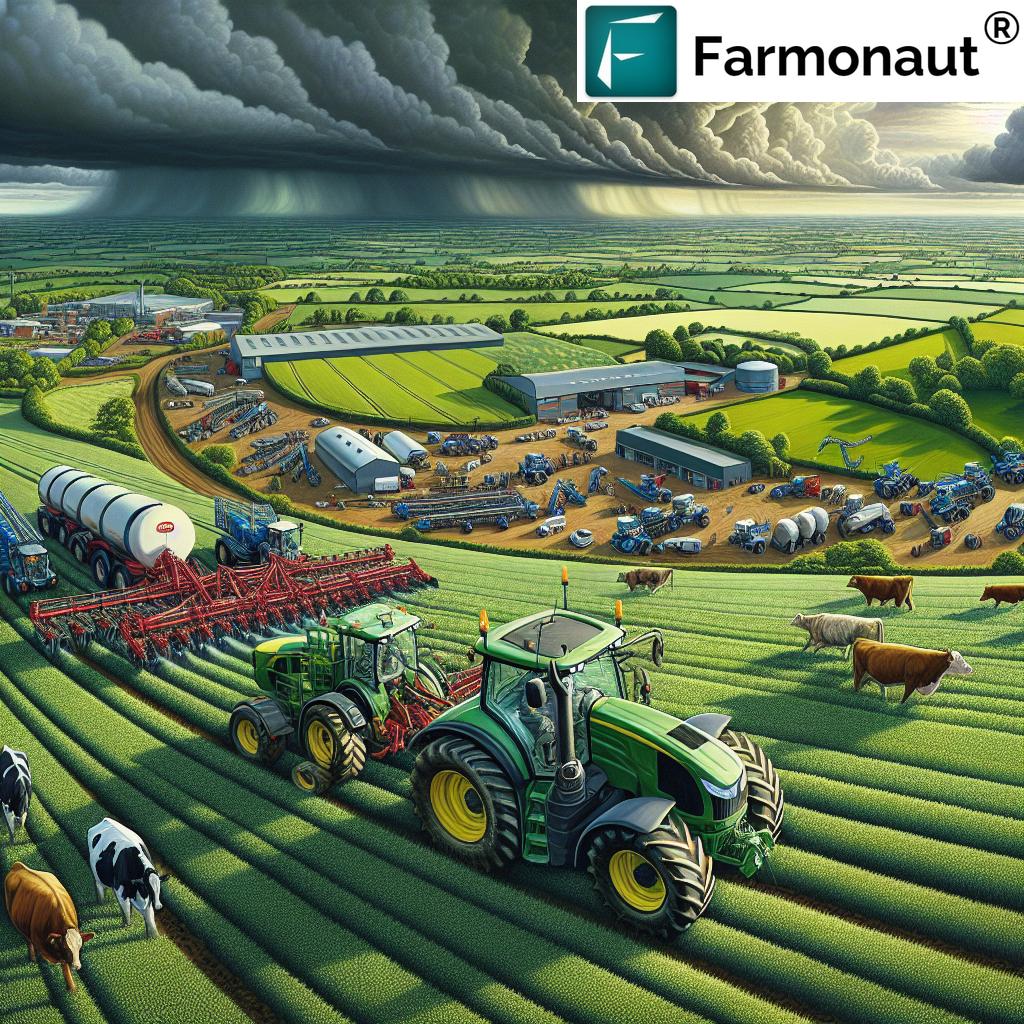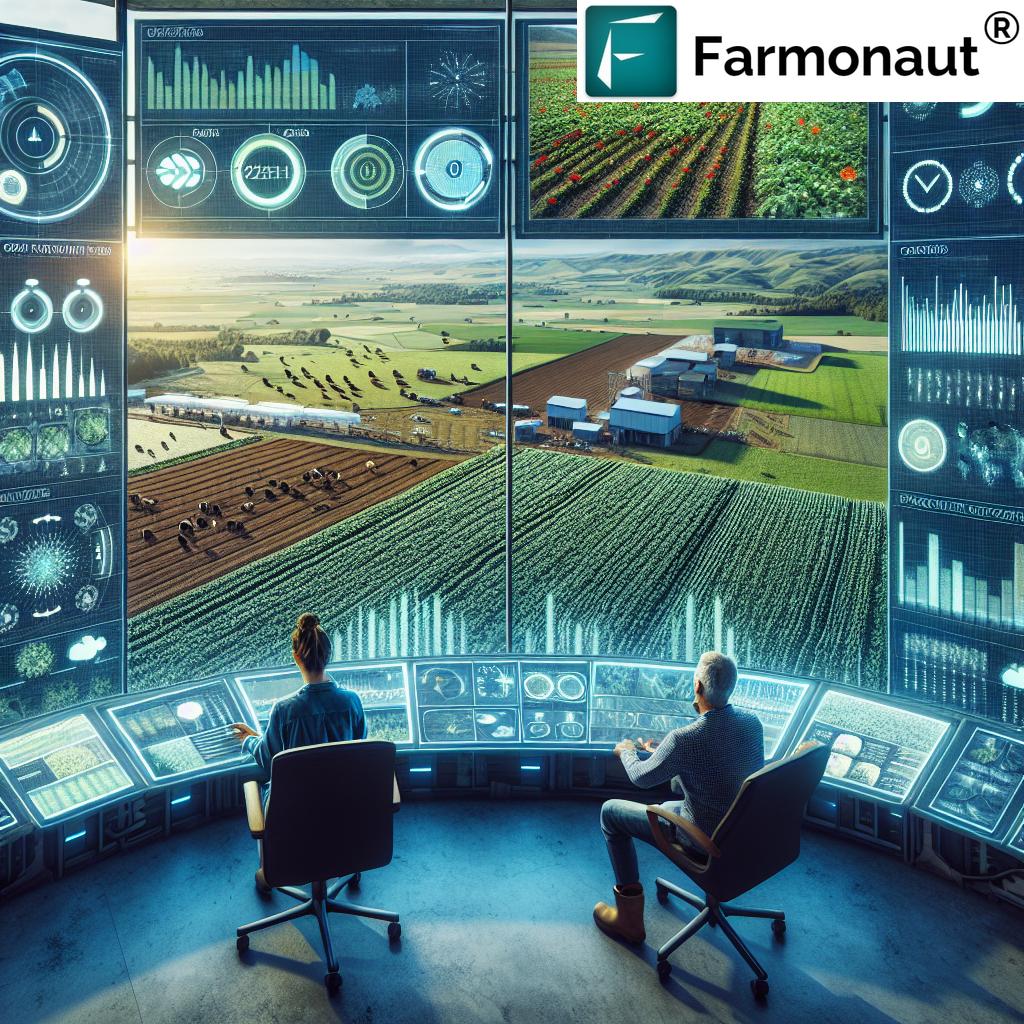UK Food Supply Chain Crisis: How Farmonaut’s Technology Strengthens Agricultural Resilience

“Brexit impacts and labour shortages have affected over 70% of UK farms, threatening national food security.”
In recent years, the United Kingdom’s agricultural sector has faced unprecedented challenges, with the food supply chain reaching a critical breaking point. As we at Farmonaut closely monitor these developments, we recognize the urgent need for innovative solutions to strengthen agricultural resilience across England, Scotland, and Wales. The convergence of Brexit impacts, labour shortages, and import issues has created a perfect storm, threatening food security and market stability in ways that demand immediate attention and action.
In this comprehensive blog post, we’ll delve into the complexities of the UK food supply chain crisis, exploring its multifaceted impacts on various aspects of agriculture – from arable and livestock farming to dairy production and crop management. We’ll examine the role of government support, the imperative for sustainable farming practices, and strategies to enhance supply chain resilience. Moreover, we’ll highlight how technological advancements, including those offered by Farmonaut, can play a pivotal role in mitigating these challenges and securing the future of British farming.
The Perfect Storm: Understanding the UK’s Agricultural Challenges
The UK’s farming sector is grappling with a confluence of issues that have pushed the food supply chain to its limits:
- Brexit Impacts: The departure from the European Union has introduced new trade barriers, affecting both imports of essential farming inputs and exports of agricultural products.
- Labour Shortages: Restrictions on free movement have led to a significant reduction in seasonal workers, crucial for harvesting and processing.
- Supply Chain Disruptions: Global events and local challenges have strained logistics, leading to delays and increased costs in transporting goods.
- Market Price Volatility: Fluctuations in currency and trade agreements have created unpredictable market conditions for farmers.
These factors have collectively contributed to a precarious situation for UK agriculture, necessitating innovative approaches to ensure food production remains robust despite current obstacles.
The Role of Technology in Agricultural Resilience
At Farmonaut, we believe that technology holds the key to overcoming many of the challenges facing UK agriculture. Our satellite-based farm management solutions offer powerful tools for farmers to optimize their operations and enhance resilience:
- Real-time Crop Health Monitoring: Our satellite imagery provides farmers with up-to-date information on crop health, enabling timely interventions.
- AI-driven Advisory Systems: Our Jeevn AI system offers personalized recommendations for crop management, helping farmers make informed decisions.
- Resource Management Tools: We help farmers optimize their use of water, fertilizers, and other inputs, reducing waste and improving efficiency.
By leveraging these technologies, farmers can mitigate some of the impacts of labour shortages and supply chain disruptions, ensuring more stable and productive farming operations.
Strengthening Supply Chain Resilience
The UK food supply chain crisis has highlighted the need for greater resilience and adaptability in the agricultural sector. Here are some strategies that can help strengthen the supply chain:
- Diversification: Encouraging farmers to diversify their crops and livestock can reduce dependence on single markets or products.
- Local Food Production: Promoting local food systems can shorten supply chains and reduce vulnerability to international disruptions.
- Technology Adoption: Implementing advanced farm equipment and digital solutions can improve efficiency and reduce reliance on manual labour.
- Sustainable Practices: Adopting sustainable farming methods can improve long-term resilience and reduce environmental impacts.
Farmonaut’s technology supports these strategies by providing farmers with the tools they need to make data-driven decisions and optimize their operations.
Government Support and Policy Initiatives
The role of government in supporting farmers and strengthening the agricultural sector cannot be overstated. Some key areas where government intervention can make a significant impact include:
- Financial Support: Providing grants and subsidies to help farmers invest in new technologies and sustainable practices.
- Regulatory Framework: Developing policies that support local food production and streamline import/export processes.
- Education and Training: Investing in programs to upskill farmers in the use of new technologies and sustainable farming methods.
- Research and Development: Funding agricultural research to develop innovative solutions to current challenges.
At Farmonaut, we work closely with government agencies to provide data-driven insights that can inform policy decisions and support initiatives aimed at strengthening the agricultural sector.

“UK farmers have seen a 25% increase in operational costs due to supply chain disruptions and import challenges.”
Innovative Approaches to Livestock and Dairy Farming
The challenges facing the UK’s food supply chain extend to livestock and dairy farming, crucial components of the agricultural sector. Here are some innovative approaches to combat these issues:
- Precision Livestock Farming: Using technology to monitor animal health, optimize feeding, and improve overall herd management.
- Grassland Management: Implementing advanced techniques for pasture management to improve grazing efficiency and reduce feed costs.
- Parasite Control: Utilizing data-driven approaches to manage parasites more effectively, reducing the impact on livestock health and productivity.
- Youngstock Management: Implementing targeted strategies to improve the health and growth of young animals, ensuring a more productive future herd.
Farmonaut’s satellite-based solutions can assist in these areas by providing accurate data on pasture health and growth, enabling farmers to make informed decisions about grazing rotations and feed management.
Sustainable Farming Practices: A Path to Resilience
Adopting sustainable farming practices is not just an environmental imperative but also a key strategy for building resilience in the face of supply chain challenges. Here’s how sustainability can strengthen UK agriculture:
- Soil Health Management: Implementing practices that improve soil structure and fertility, reducing reliance on chemical inputs.
- Water Conservation: Adopting efficient irrigation systems and water management practices to reduce waste and improve crop resilience to drought.
- Integrated Pest Management: Using biological and cultural controls to manage pests, reducing dependence on chemical pesticides.
- Renewable Energy: Investing in on-farm renewable energy sources to reduce operational costs and carbon footprint.
Farmonaut’s technology supports these sustainable practices by providing precise data on soil moisture, crop health, and environmental conditions, enabling farmers to make more sustainable decisions.
Explore our API for advanced agricultural data integration.
Technological Advancements in Farm Equipment
The evolution of farm equipment plays a crucial role in addressing the challenges faced by UK agriculture. Modern machinery and tools can significantly improve efficiency and productivity:
- Tractors: GPS-guided tractors with precision steering capabilities reduce overlap and improve field efficiency.
- Sprayers and Spreaders: Variable-rate technology allows for precise application of inputs, reducing waste and environmental impact.
- Cultivators and Drills: Advanced designs improve soil preparation and seed placement, enhancing crop establishment.
- Combines: Modern combines with yield mapping capabilities provide valuable data for future crop planning.
Farmonaut’s satellite data can be integrated with these advanced machinery systems, providing a comprehensive view of farm operations and enabling more precise management decisions.
Adapting to Market Trends and Consumer Demands
As the UK agricultural sector navigates the current crisis, it’s crucial to stay attuned to evolving market trends and consumer preferences:
- Plant-based Products: The growing demand for plant-based alternatives presents opportunities for diversification in crop production.
- Organic and Sustainable Products: Increasing consumer interest in environmentally friendly food options drives demand for organic and sustainably produced goods.
- Traceability: Consumers are increasingly interested in knowing the origin and journey of their food, creating opportunities for transparent supply chains.
- Local Food Systems: The trend towards supporting local producers can help strengthen regional food security.
Farmonaut’s blockchain-based traceability solutions can help farmers and food producers meet these consumer demands by providing transparent and verifiable information about their products.
Discover our comprehensive solutions through our API Developer Docs.
The Future of UK Agriculture: Trends and Predictions
Looking ahead, several trends are likely to shape the future of UK agriculture and its ability to overcome supply chain challenges:
- Vertical Farming: Urban agriculture solutions may help alleviate some supply chain pressures and reduce transportation needs.
- Precision Agriculture: Continued advancements in data-driven farming will enable more efficient and sustainable production.
- Automation and Robotics: As labour shortages persist, the adoption of automated systems and agricultural robots is likely to increase.
- Climate-Resilient Crops: The development and adoption of crop varieties better suited to changing climate conditions will be crucial.
Farmonaut is committed to staying at the forefront of these trends, continually evolving our technology to meet the changing needs of UK farmers and the global agricultural community.
UK Agricultural Challenges and Technological Solutions
| Challenge | Impact on UK Agriculture | Farmonaut’s Technological Solution |
|---|---|---|
| Labour Shortages | 20% reduction in available workforce | Automated Crop Monitoring and AI-driven Advisory |
| Brexit Impacts | 15% increase in import costs | Supply Chain Optimization and Local Production Support |
| Supply Chain Disruptions | 25% increase in operational costs | Blockchain-based Traceability and Resource Management |
| Climate Change | 10% yield reduction due to extreme weather | Climate-Resilient Crop Recommendations and Weather Forecasting |
| Market Price Volatility | 30% fluctuation in commodity prices | AI-Driven Market Analysis and Crop Planning |
Conclusion: Building a Resilient Future for UK Agriculture
The UK food supply chain crisis presents significant challenges, but it also offers opportunities for innovation and transformation in the agricultural sector. By embracing technological solutions, adopting sustainable practices, and fostering collaboration between farmers, government, and technology providers, we can build a more resilient and productive agricultural industry.
At Farmonaut, we are committed to supporting UK farmers through this challenging period and beyond. Our advanced satellite-based technologies, AI-driven insights, and blockchain solutions provide the tools needed to navigate the complexities of modern agriculture and strengthen the UK’s food security.
As we look to the future, the path forward is clear: by combining traditional farming wisdom with cutting-edge technology, we can create an agricultural sector that is not only resilient to current challenges but also prepared for the opportunities of tomorrow.
Experience the power of Farmonaut’s solutions:
Farmonaut Subscriptions
Frequently Asked Questions
- How is Brexit affecting UK agriculture?
Brexit has introduced new trade barriers, affecting both imports of farming inputs and exports of agricultural products. This has led to increased costs and logistical challenges for UK farmers. - What are the main causes of labour shortages in UK farming?
The primary causes include restrictions on free movement post-Brexit, which has reduced the availability of seasonal workers crucial for harvesting and processing. - How can technology help address the UK food supply chain crisis?
Technologies like Farmonaut’s satellite-based solutions can help by providing real-time crop monitoring, AI-driven advisory services, and resource management tools, enabling farmers to optimize their operations and reduce reliance on manual labour. - What role does the UK government play in supporting farmers during this crisis?
The government can provide financial support, develop supportive policies, invest in education and training, and fund agricultural research to help farmers adapt to current challenges. - How can sustainable farming practices contribute to supply chain resilience?
Sustainable practices can improve soil health, reduce dependence on chemical inputs, and enhance crop resilience to environmental stresses, contributing to more stable and reliable food production.






